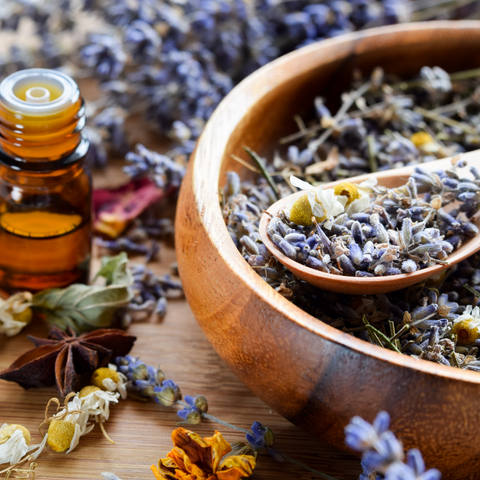Herbs for Health
The 29th of August marks more herbs, less salt day. The day was started in an effort to curb the amount of sodium that is consumed in the average diet in this day and age. With prepacked, convenience foods becoming more popular, the amount of sodium we are consuming is climbing. More herbs, less salt day is all about finding new creative ways to flavour our food and encouraging people the cook and be creative in the kitchen. A diet rich in fruits, vegetables, proteins and herbs and spices is vital to a healthy body and mind. We've rounded up some of the best herbs and what they can do for you!

Sage > Brain function and memory
Sage may be able to improve brain function and memory function, especially in those with Alzheimer's. Alzheimer's causes the level of a chemical messenger called acetylcholine to drop. Sage blocks the breakdown of acetylcholine.
Holy basil > Infections and immunity
Holy basil (not regular supermarket basil or Thai basil) can inhibit growth of many types of bacteria, yeast and moulds. It can also boost the immune system by increasing the number of immune cells in the blood.
Fenugreek > Blood sugar control
Popular in Asian cuisines, fenugreek leaves contain the plant protein 4-hydroxyisoleucine which improves the function of the hormone insulin. Around 1 gram of fenugreek a day has been sown to actively lower blood sugar levels, especially in those with diabetes.

Rosemary > Allergies and nasal congestion
Rosemary’s active ingredient is rosmarinic acid. Rosmarinic acid suppresses the allergenic response and eases nasal congestion. The number of immune cells in nasal mucus is also decreased.
Peppermint > IBS pain and nausea
Peppermint oil is favoured for it’s IBS fighting properties. It works by relaxing the smooth muscles in the colon and reducing abdominal bloating. Both of these causes people with IBS a lot of pain and discomfort. When used in aromatherapy, peppermint can be very effective in reducing nausea.
Evening primrose > Skin conditions and PMS
The flower of this plant gives an oil that is well loved for it’s skin soothing abilities. Evening primrose can ease eczema and atopic dermatitis. It can also be useful for those with polycystic ovary syndrome and to ease hormonal breast pain.

Tea tree > Powerful antimicrobial/antifungal
Tea tree is a popular herb in its oil form. Tea tree is a powerful antimicrobial/antifungal agent which makes it useful for treating athlete's foot, cuts, insect bites, and even acne. Tea tree should always be diluted and never ingested.
Lavender > Anxiety and brain function
Lavender is great for soothing anxiety. Lavender can also act as a slight sedative and help you get a solid night's sleep. Lavender also has anti-inflammatory properties and can help with migraines and high blood pressure.
Chamomile > Stress and anxiety
Chamomile is another popular plant favoured for it’s anti-anxiety properties. Chamomile is popular in tea form but is also found in tablet or liquid supplement form, taken to ease stress, anxiety and improve sleep.

Parsley > Antioxidant and cancer fighting
Parsley is high in antioxidants, vitamins A and C and a chemical called apigenin which has been shown to inhibit the growth of cancer cells by several studies.
Nettle > Hair health and arthritis
Nettles are such an underrated herbal hero. Nettles have anti-inflammatory properties and as a result can help reduce the pain of arthritis. Nettles are also great for hair health by controlling dandruff and helping become glossy and strong. Nettle tea is the most popular form.
Coriander > Cholesterol
Coriander helps lower ‘bad’ cholesterol and increases ‘good’ cholesterol, reducing the risk of coronary heart disease. Coriander is also full of antioxidants which help remove free radicals from the body, reducing your risk of certain cancers and even signs of ageing.

Dandelion > Digestion
Dandelion root can improve gastrointestinal complaints as well as boosting the function of the liver and gallbladder. The herb is considered a mild diuretic which means it’s useful for poor digestion, liver disorders and high blood pressure.
Oregano > High antioxidants
Oregano is full of antioxidants, as much as 20 times more than most herbs and 4 times more than blueberries. It’s one of the very best sources of antioxidants around.
If you have any questions about today's blog, please contact us and join our Facebook Support Group where you can find a helpful and supportive community that will cheer you on on your journey to a stronger pelvic floor.
We hope you enjoyed this blog, why not check out 7 Houseplants That Boost Your Health And Wellness or 5 Astonishing Health Benefits Of Iodine
Fancy a freebie? Download our FREE guide to holistic period pain remedies or The easy way to get a stronger pelvic floor
References
8 of the World's Healthiest Spices & Herbs You Should Be Eating | EatingWell
10 Healthy Herbs and How to Use Them - Diet and Nutrition Center - Everyday Health
10 Delicious Herbs and Spices With Powerful Health Benefits (healthline.com)
9 Most Powerful Medicinal Plants and Herbs, Backed by Science (healthline.com)
#secretwhispers #dontignorethepelvicfloor #kegel #kegelweights #pelvicfloordumbbell #PelvicFloorChat #losetheleak #herbalremedy #herbs #holistic #health










